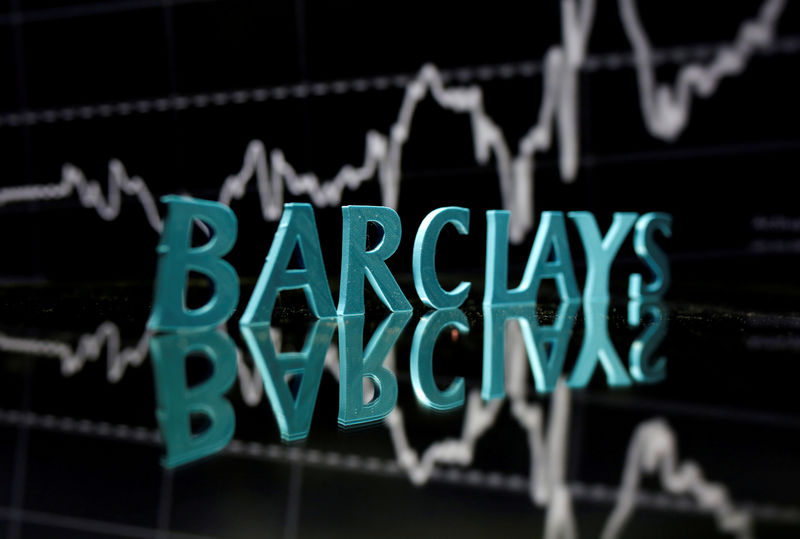By Lawrence White and Sinead Cruise
LONDON (Reuters) - Ten years on from the global financial crisis caused by a crash in bonds tied to U.S. home loans, Britain's Barclays (LON:BARC) is betting a return to that market can bring in bumper revenues to fortify its investment bank.
After the crisis, banks initially shunned the business of selling and trading slices of loans tied to residential property, autos or commercial real estate, as such securitizations were demonized for their role in the crash.
But now Barclays is preparing to make its comeback, having assembled a team of over 140 securitization bankers and traders with plans to hire more as investors clamor for the higher returns such deals offer compared with traditional stocks and bonds.
Having pared back its securitization business in recent years amid a wider restructuring, Barclays' head of global markets Stephen Dainton said the time was right for the British bank to re-enter the market in force.
"This was a 500 million pound ($632.80 million) business for Barclays in terms of revenues last year, when global peers are making 1 billion pounds a year, so for us to get to 500 million pounds additional revenue over 3 years or 100-150 million pounds a year should be achievable at measured pace", he said.
The success of that bid would be a huge fillip for Barclays Chief Executive Jes Staley, who is in a race against time to increase investment banking profits and vindicate his faith in a business that an activist investor argues should be cut back.
Barclays' push is led by veteran securitized assets trader Scott Eichel, who had ringside seats to the highs and lows of the mortgage-backed securities market at Bear Stearns in the run-up to the 2008 crash, and Royal Bank of Scotland (LON:RBS) afterwards.
Now head of securitized products for Barclays, Eichel has assembled a team of 144 bankers and traders who package up and sell everything from commercial and residential home loans to more esoteric assets such as media and sports franchise rights.
"The market has changed both outside and inside banks, both from a regulatory perspective and best practises inside firms," Eichel said.
"When you dissect the revenues, those years around the crisis were very heavily trading based, whereas now you are back to the banking model where about 80 percent of your revenues are coming from financing and origination."
That means banks are primarily making money from the intended purpose of securitizations- providing companies and homeowners improved access to credit by pooling the risk of lending to them- rather than making bets on the market.
TRUMP
Barclays' return to the market is a bold gambit given it paid $2 billion in March last year to settle a U.S. probe into its alleged mis-selling of the mortgage-backed bonds that helped to trigger the 2008 crash.
The biggest attempt by a British bank to tap into the U.S. securitization market since that crisis is already showing signs of progress.
Barclays ranks sixth for sales of U.S. securitizations this year, up two places from the same period a year ago according to Refinitiv data.
Only Credit Suisse (SIX:CSGN) in third place, is ahead of Barclays among European banks in the U.S. market which is the world's biggest for securitizations.
Deutsche Bank (DE:DBKGn) ranks ninth.
Barclays is also third overall for underwriting asset-backed securities in the United States, up one place from a year ago, according to the data and again behind top-ranked Credit Suisse.
Barclays is hopeful signs of softening U.S. regulations underpinning the securitization industry could help to consolidate and expand its burgeoning market share, a source familiar with the matter told Reuters.
A report by the U.S. Treasury in October 2017 prompted by an executive order from President Donald Trump backed the view that post-crisis regulation of the sector went too far.
"The result has been to dampen the attractiveness of securitization, potentially cutting off or raising the cost of credit to thousands of corporate and retail consumers," the report said. It recommended loosening the capital requirements for banks underwriting securitizations.
Barclays plans to increase slowly the team under Eichel to around 177 bankers and traders, targeting not just the United States but also Europe where there is an active market for securitizing assets, including underperforming and capital intensive real estate loans bloating many banks' balance sheets.

"We're doing what regulators want banks to do, which is help customers to get financing so businesses can grow, and help investors who buy those bonds to get the liquidity they need,” Eichel said.